Jade Varden's Blog, page 26
September 16, 2014
Writing 101: Wikipedia is Not a Source
If you want to be an author and you want to write amazing books, there's one thing you have to know and keep in mind at all times: Wikipedia is not a source. Really, that's all you need to know. But there are some people out there who are going to want to know why they can't use Wikipedia to research their stories. For those people, I'm writing this post.
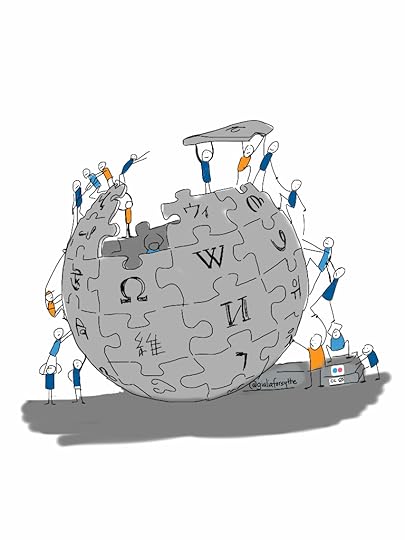
Public Opinion
Wikipedia passes itself off as an encyclopedia, and it's incredibly attractive. You can type in almost any name, any book, any movie and learn more about it. I know this better than most, because I can go to Wikipedia and suddenly spend an entire hour checking up on sitcom stars from the 1950s (don't ask). It's full of links and there's a lot you can find out, and that's all amazing. But there's a fly in the ointment. Wikipedia is not all that it appears to be. And there's one strong reason that no writer can use Wikipedia as a source at any time: it's not accurate.
Wikipedia is not an encyclopedia, though I am willing to concede that it looks an awful lot like one. You see, true encyclopedias (Columbia, for example, or Encyclopedia Brittanica) have their facts checked -- repeatedly, and carefully. No one fact-checks Wikipedia. True encyclopedias hire academics and writers to deliver concise informaton about people, places and historical events. Wikipedia doesn't hire anyone to provide content.
All of the content on Wikipedia is provided for free by ordinary people. True, some of those people are molecular biologists and historians. But some of them are 7th graders. Some of the people who create and edit entries for Wikipedia are PhDs who have studied extensively. Some of them are only on the website because Daniel Tosh told them to get on there and change something. Stephen Colbert once told people to change a page on Wikipedia just for fun, and over a year later you can still find inaccurate information embedded deep in the site's entries about the American Revolution. I can't stress this enough: Wikipedia is not accurate. That's why writers can't use it. That's why you can't use it.
I'm not saying that everything on Wikipedia is incorrect. In fact, the opposite is true. What I'm saying is that anyone, anyone, can get on Wikipedia and write that the American Revolution was all about guns. It was not. It had nothing to do with guns. But maybe you go to Wikipedia and you see something that a late night talk show host asked his fans to change, just so he could poke fun at Sarah Palin (again, don't ask). Maybe you write a story all about a patriot who didn't want England to take his musket away from him in the 1700s. That's going to make me go insane.
There is one way, only one way, that Wikipedia can be used as a source of information. First, look up whatever it is you're researching. Hurricanes, maybe, or oranges. Now scroll down. Skip all that questionable content that may have been written by an orange scientist, but may also have been written by Billy who just celebrated his 13th birthday. Look at the bottom of the information for the list of links. Most all Wikipedia entries have these links. Often, these links can be used as sources of real information -- information that's been fact-checked, anyway. This is the only way to use Wikipedia...so don't let me catch you using it for something else!

Public Opinion
Wikipedia passes itself off as an encyclopedia, and it's incredibly attractive. You can type in almost any name, any book, any movie and learn more about it. I know this better than most, because I can go to Wikipedia and suddenly spend an entire hour checking up on sitcom stars from the 1950s (don't ask). It's full of links and there's a lot you can find out, and that's all amazing. But there's a fly in the ointment. Wikipedia is not all that it appears to be. And there's one strong reason that no writer can use Wikipedia as a source at any time: it's not accurate.
Wikipedia is not an encyclopedia, though I am willing to concede that it looks an awful lot like one. You see, true encyclopedias (Columbia, for example, or Encyclopedia Brittanica) have their facts checked -- repeatedly, and carefully. No one fact-checks Wikipedia. True encyclopedias hire academics and writers to deliver concise informaton about people, places and historical events. Wikipedia doesn't hire anyone to provide content.
All of the content on Wikipedia is provided for free by ordinary people. True, some of those people are molecular biologists and historians. But some of them are 7th graders. Some of the people who create and edit entries for Wikipedia are PhDs who have studied extensively. Some of them are only on the website because Daniel Tosh told them to get on there and change something. Stephen Colbert once told people to change a page on Wikipedia just for fun, and over a year later you can still find inaccurate information embedded deep in the site's entries about the American Revolution. I can't stress this enough: Wikipedia is not accurate. That's why writers can't use it. That's why you can't use it.
I'm not saying that everything on Wikipedia is incorrect. In fact, the opposite is true. What I'm saying is that anyone, anyone, can get on Wikipedia and write that the American Revolution was all about guns. It was not. It had nothing to do with guns. But maybe you go to Wikipedia and you see something that a late night talk show host asked his fans to change, just so he could poke fun at Sarah Palin (again, don't ask). Maybe you write a story all about a patriot who didn't want England to take his musket away from him in the 1700s. That's going to make me go insane.
There is one way, only one way, that Wikipedia can be used as a source of information. First, look up whatever it is you're researching. Hurricanes, maybe, or oranges. Now scroll down. Skip all that questionable content that may have been written by an orange scientist, but may also have been written by Billy who just celebrated his 13th birthday. Look at the bottom of the information for the list of links. Most all Wikipedia entries have these links. Often, these links can be used as sources of real information -- information that's been fact-checked, anyway. This is the only way to use Wikipedia...so don't let me catch you using it for something else!
Published on September 16, 2014 05:30
September 15, 2014
Writing 101: Why Do So Many Authors Commit Suicide?
Suicide. It's certainly a dark topic, but to ignore it completely would be an injustice to literature. Many authors have written poignantly about suicide from a variety of different angles. And many more authors have actually killed themselves. In fact, the number of authors who have is rather startling. So today I have to ask, why do so many authors commit suicide...and are we more at risk than people with non-writing careers?

Gone, Not Forgotten
Some of the most brilliant authors committed suicide. The list includes Virginia Woolf, who filled her pockets with rocks before she walked into the river at age 59. Edgar Allen Poe clearly thought about death a great deal, as evidenced by his work, and tried to kill himself at least once before he died under mysterious circumstances in 1849 at age 40.
Novelist Cesare Pavese was disillusioned by politics and overdosed on pills in his hotel room. In a bizarre twist, the suicide mirrored a scene depicted in his book Among Women Only. He was 41. Paul Celan, who wrote poetry, was 49 when he threw himself into the Seine.
One of the most notable author suicides is that of Sylvia Plath. It's notable because she wrote about suicide in The Bell Jar , a book that continues to be studied and shared all over the world. The dark tale details a young woman's thoughts about suicide. The work is largely autobiographical, though Plath changed all the names. She did commit suicide shortly after the book was written and died at age 30.
Are you a danger to yourself if you're an author?
Are You At Risk?
So, are authors more prone to suicide? According to some research, it's possible. Psychologist James C. Kaufman studied what he named The Sylvia Plath effect in 2001. His studies show a potential link between creative writers and mental illness, though his findings are preliminary. According to his research, female poets are more inclined toward mental illness than female fiction writers and male writers of any kind. In another study, female writers were found to be more likely to experience eating disorders, anxiety and panic attacks. However, research shows that all women are more inclined toward mental illness than men. They are more likely to experience depression, and married women are twice as likely to be depressed as single women. Sylvia Plath was married when she committed suicide.
Career-related studies in suicide do not show a link between authors and self-inflicted death. According to numerous studies, physicians are more likely to kill themselves than those in any other job. Other top at-risk jobs include real estate agents, lawyers, farmers, electricians, pharmacists and natural scientists.

Gone, Not Forgotten
Some of the most brilliant authors committed suicide. The list includes Virginia Woolf, who filled her pockets with rocks before she walked into the river at age 59. Edgar Allen Poe clearly thought about death a great deal, as evidenced by his work, and tried to kill himself at least once before he died under mysterious circumstances in 1849 at age 40.
Novelist Cesare Pavese was disillusioned by politics and overdosed on pills in his hotel room. In a bizarre twist, the suicide mirrored a scene depicted in his book Among Women Only. He was 41. Paul Celan, who wrote poetry, was 49 when he threw himself into the Seine.
One of the most notable author suicides is that of Sylvia Plath. It's notable because she wrote about suicide in The Bell Jar , a book that continues to be studied and shared all over the world. The dark tale details a young woman's thoughts about suicide. The work is largely autobiographical, though Plath changed all the names. She did commit suicide shortly after the book was written and died at age 30.
Are you a danger to yourself if you're an author?
Are You At Risk?
So, are authors more prone to suicide? According to some research, it's possible. Psychologist James C. Kaufman studied what he named The Sylvia Plath effect in 2001. His studies show a potential link between creative writers and mental illness, though his findings are preliminary. According to his research, female poets are more inclined toward mental illness than female fiction writers and male writers of any kind. In another study, female writers were found to be more likely to experience eating disorders, anxiety and panic attacks. However, research shows that all women are more inclined toward mental illness than men. They are more likely to experience depression, and married women are twice as likely to be depressed as single women. Sylvia Plath was married when she committed suicide.
Career-related studies in suicide do not show a link between authors and self-inflicted death. According to numerous studies, physicians are more likely to kill themselves than those in any other job. Other top at-risk jobs include real estate agents, lawyers, farmers, electricians, pharmacists and natural scientists.
Published on September 15, 2014 05:30
September 11, 2014
Writing 101: When to Change Your Story
You've just started your new book, and you're excited. Everything is great...until you go to the movies, and you see a trailer for a plot that looks exactly the same as your new book. Being an author means you have to know when to change your story.
Simpsons Did It
I had to face a similar circumstance recently. I went back to an old project to complete it, and found that one of my characters has the same name as a character in another book series. A much more popular book series. And it's also a TV show. And even if I were to take a magic potion, my book isn't going to become as popular as that other book. Doesn't that mean that I have to change my story?
I've said, many times, that there are no original plots. What the ancient Greeks didn't already write about, Shakespeare did. And let's face it: I'm no Shakespeare. Since I'm no George R. R. Martin either, isn't the burden on me to change my story so readers don't think I'm trying to copy more popular (and arguably more skilled) authors?
No. Don't ever change the story you want to tell because of something another author is doing. If you spend your time worrying about similar plots and identical names, you'll make yourself crazy. There are too many books out there to be 100 percent different from every single one.
That said, clearly it's not the greatest idea to write a vampire book using two main characters named Bella and Edward. If your book too closely resembles several major aspects of a very famous tale, some tweaking may indeed be in order.
Simpsons Did It
I had to face a similar circumstance recently. I went back to an old project to complete it, and found that one of my characters has the same name as a character in another book series. A much more popular book series. And it's also a TV show. And even if I were to take a magic potion, my book isn't going to become as popular as that other book. Doesn't that mean that I have to change my story?
I've said, many times, that there are no original plots. What the ancient Greeks didn't already write about, Shakespeare did. And let's face it: I'm no Shakespeare. Since I'm no George R. R. Martin either, isn't the burden on me to change my story so readers don't think I'm trying to copy more popular (and arguably more skilled) authors?
No. Don't ever change the story you want to tell because of something another author is doing. If you spend your time worrying about similar plots and identical names, you'll make yourself crazy. There are too many books out there to be 100 percent different from every single one.
That said, clearly it's not the greatest idea to write a vampire book using two main characters named Bella and Edward. If your book too closely resembles several major aspects of a very famous tale, some tweaking may indeed be in order.
Published on September 11, 2014 05:30
September 10, 2014
Writing 101: Fear of Failure
For every single indie author who takes the plunge and self-publishes a book, there are probably 5 or 6 authors who write books they don't ever publish. But it doesn't matter how many books you publish. You can always wind up struggling with a fear of failure. The real question is: can you defeat it?
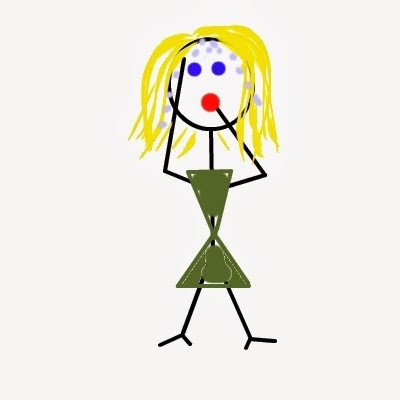
Are You Afraid of the Words?
Anyone can fail at something, no matter how good they are at it ordinarily. Professional athletes, great actors and career politicians prove this to us all the time. Failure is a part of life, and we all do it. But when you're an indie author, failure feels especially frightening. What if you spend all this time working on your book, pouring your love and your sweat into it? What if you fall in love with it and you truly know how great it is? What if no one buys it? Even worse, what if everyone hates it?
Doesn't that make you a failure?
All authors, indie and traditional, dread that 1-star review. All authors feel at least a little twinge of anxiety when one of their brand-new books hits the bookstore shelves, virtual and otherwise. No one wants to fail. And to avoid it, some authors may find that they're putting themselves in a position not to fail. As an author, there's really only one surefire way to do that: stop publishing.
But if you're an author, that isn't really much of an option is it? Therefore, you can't stop publishing. This leaves you with but one more option. You're going to have to face your fear of failure.
There are ways to do it, of course. I like to cheer myself up by looking at Amazon reviews of the popular classics. Focus on the negative ones, and you'll find that any book can be hated. So if yours is as well, at least it's in good company. You can also farm your book out to a few trusted beta readers just to get their opinion on it. If they have a positive reaction, that could bolster your confidence. You can remind yourself that you're a professional and failure is a part of the game. It's healthy, even, and who knows you'll even face failure?
When all else fails, fall back on one time-tested solution that's worked for other authors in the past: do it anyway. It's scary, and yes you may fail. But you've got to publish anyway. Otherwise, your words won't be read. Isn't that the worst of all possible outcomes?

Are You Afraid of the Words?
Anyone can fail at something, no matter how good they are at it ordinarily. Professional athletes, great actors and career politicians prove this to us all the time. Failure is a part of life, and we all do it. But when you're an indie author, failure feels especially frightening. What if you spend all this time working on your book, pouring your love and your sweat into it? What if you fall in love with it and you truly know how great it is? What if no one buys it? Even worse, what if everyone hates it?
Doesn't that make you a failure?
All authors, indie and traditional, dread that 1-star review. All authors feel at least a little twinge of anxiety when one of their brand-new books hits the bookstore shelves, virtual and otherwise. No one wants to fail. And to avoid it, some authors may find that they're putting themselves in a position not to fail. As an author, there's really only one surefire way to do that: stop publishing.
But if you're an author, that isn't really much of an option is it? Therefore, you can't stop publishing. This leaves you with but one more option. You're going to have to face your fear of failure.
There are ways to do it, of course. I like to cheer myself up by looking at Amazon reviews of the popular classics. Focus on the negative ones, and you'll find that any book can be hated. So if yours is as well, at least it's in good company. You can also farm your book out to a few trusted beta readers just to get their opinion on it. If they have a positive reaction, that could bolster your confidence. You can remind yourself that you're a professional and failure is a part of the game. It's healthy, even, and who knows you'll even face failure?
When all else fails, fall back on one time-tested solution that's worked for other authors in the past: do it anyway. It's scary, and yes you may fail. But you've got to publish anyway. Otherwise, your words won't be read. Isn't that the worst of all possible outcomes?
Published on September 10, 2014 05:30
September 9, 2014
Writing 101: Can You Be Too Disciplined?
When you are a self-published author, you've got to be your own boss. That meas being hard on yourself, sometimes. You've got to tell yourself to get to work when that great movie is on cable, say "thanks but no thanks" to certain social outings in order to get more done, sit at the computer screen to write when you'd rather be on Twitter. But it is possible to be too hard on yourself. Can you be too disciplined?
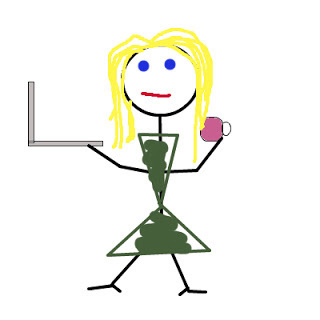
Driven
The indie author game moves quickly. New books are published every single day, and new authors are appearing on Twitter like an ever-recycling magic trick. You've got to keep tweeting, keep blogging, keep publishing and keep staying active if you want to stay in the game. And when you also have to work a full-time job, maintain a social life, keep up some degree of a family life and still take care of yourself, you've got to be driven. You've got to stay motivated. You've got to keep working.
Because you've got to do all this, you can start driving yourself a little too hard to get it all done. And I ought to know. You can be too disciplined. I know, because I am.
I'm officially a terrible boss. I've been this way for a while (I've even blogged about it before), so this is not behavior that I've managed to correct. The problem is that I tend to be too disciplined, and believe me that's not a positive attribute that I'm trying to pretend is a flaw. It's a genuine flaw, and you may have it, too.
I know I'm too disciplined, because I only get more than 5 hours of sleep a night on Saturdays (when I get 7). Some days, I only sleep for 4 hours. It's not because I'm awake all hours having a good time. I'm awake writing, and blogging, and tweeting and doing all the stuff that indie authors have to fit in around the periphery of their day-to-day lives.
And frankly, I'm exhausted. My judgement is so impaired when it comes to my newest book project that it's been finished for weeks and I can't decide whether or not to even release it. My thoughts are so scattered that I've been holding entire conversations with people and forgetting them 5 minutes later. Other people watch TV around me, and I have no idea what's been on the screen for three hours.
I'm getting a lot of stuff done, but I'm not getting a whole lot out of it. That's too disciplined, and any indie author can get to this point. Any self-published author can take on too many tasks and then convince themselves they've got to complete them all.
But you can't drive yourself that hard all the time, and I'm not going to, either. I'm taking a small vacation later this month and taking a long weekend off, because I drive myself to work all the time. And anyone can drive themselves mad if they work too hard, even an indie author. So take a break, take a breath, and don't forget that your favorite employee needs some down time, too.

Driven
The indie author game moves quickly. New books are published every single day, and new authors are appearing on Twitter like an ever-recycling magic trick. You've got to keep tweeting, keep blogging, keep publishing and keep staying active if you want to stay in the game. And when you also have to work a full-time job, maintain a social life, keep up some degree of a family life and still take care of yourself, you've got to be driven. You've got to stay motivated. You've got to keep working.
Because you've got to do all this, you can start driving yourself a little too hard to get it all done. And I ought to know. You can be too disciplined. I know, because I am.
I'm officially a terrible boss. I've been this way for a while (I've even blogged about it before), so this is not behavior that I've managed to correct. The problem is that I tend to be too disciplined, and believe me that's not a positive attribute that I'm trying to pretend is a flaw. It's a genuine flaw, and you may have it, too.
I know I'm too disciplined, because I only get more than 5 hours of sleep a night on Saturdays (when I get 7). Some days, I only sleep for 4 hours. It's not because I'm awake all hours having a good time. I'm awake writing, and blogging, and tweeting and doing all the stuff that indie authors have to fit in around the periphery of their day-to-day lives.
And frankly, I'm exhausted. My judgement is so impaired when it comes to my newest book project that it's been finished for weeks and I can't decide whether or not to even release it. My thoughts are so scattered that I've been holding entire conversations with people and forgetting them 5 minutes later. Other people watch TV around me, and I have no idea what's been on the screen for three hours.
I'm getting a lot of stuff done, but I'm not getting a whole lot out of it. That's too disciplined, and any indie author can get to this point. Any self-published author can take on too many tasks and then convince themselves they've got to complete them all.
But you can't drive yourself that hard all the time, and I'm not going to, either. I'm taking a small vacation later this month and taking a long weekend off, because I drive myself to work all the time. And anyone can drive themselves mad if they work too hard, even an indie author. So take a break, take a breath, and don't forget that your favorite employee needs some down time, too.
Published on September 09, 2014 05:30
September 8, 2014
Writing 101: Just, Very and Other Empty Words
When you're in school and the teacher says you've got to write a thousand words on a topic, I'm not going to hold it against you if you fill up those two pages with empty words. But if I buy your book and you do the same thing, I'm going to get upset. And in this particular example, I'm every reader. None of us like empty words...but all writers, even me, end up using them.
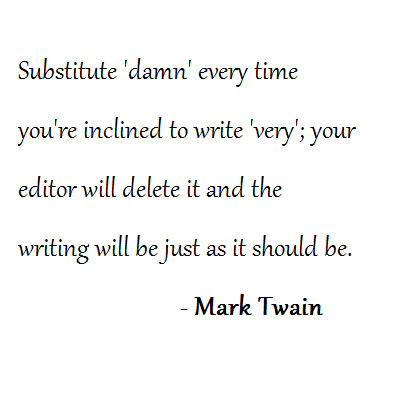
Very Merry Unwriting to You
Empty words are those words that mean nothing by themselves. Very, for example, cannot stand alone. Just, really, way and suddenly are all pretty empty, and they're all pretty over-used. When used in this context, pretty is also empty. They're empty because they don't lend anything to the story. The argument can be made that they help add emphasis, but let's not kid ourselves. There are other ways to emphasize without adding extra words. Too many of those empty words will make your book feel...well, empty.
When it comes to writing books, readers don't want to weed their way past a lot of extra words to get to the story. They just want the story. So go through your entire book, and keep an eye out for those empty words that don't add anything extra to your narrative. Be brutal.
And by brutal, I mean use the search function. I caught myself completely over-using the word just after reading something I'd written, so I used the search tool to find it everywhere -- and it was there a lot.
When you're writing a book, get to the point. Give readers the information they need to have. Don't over-stuff sentences with empty words or extra stuff. Just tell the story in plain, simple language with no filler. Try it this way, and you'll see that you get much better results than you would if you write pages and pages of flowery, stuffed text. Empty words are bad. Go forth, and annihilate them.

Very Merry Unwriting to You
Empty words are those words that mean nothing by themselves. Very, for example, cannot stand alone. Just, really, way and suddenly are all pretty empty, and they're all pretty over-used. When used in this context, pretty is also empty. They're empty because they don't lend anything to the story. The argument can be made that they help add emphasis, but let's not kid ourselves. There are other ways to emphasize without adding extra words. Too many of those empty words will make your book feel...well, empty.
When it comes to writing books, readers don't want to weed their way past a lot of extra words to get to the story. They just want the story. So go through your entire book, and keep an eye out for those empty words that don't add anything extra to your narrative. Be brutal.
And by brutal, I mean use the search function. I caught myself completely over-using the word just after reading something I'd written, so I used the search tool to find it everywhere -- and it was there a lot.
When you're writing a book, get to the point. Give readers the information they need to have. Don't over-stuff sentences with empty words or extra stuff. Just tell the story in plain, simple language with no filler. Try it this way, and you'll see that you get much better results than you would if you write pages and pages of flowery, stuffed text. Empty words are bad. Go forth, and annihilate them.
Published on September 08, 2014 05:30
September 4, 2014
Writing 101: Love at First Sight
Love at first sight is one of those things that's very rarely, if ever, found in life but it's found in books all the time. There's a good reason why authors make characters fall in love instantly: it takes a whole lot less time and energy to write. But love at first sight can be done well...if you're willing to take the time to do it.
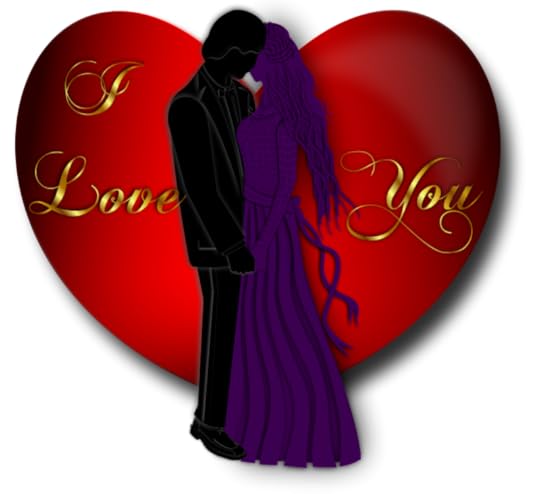
The Day I Met You
Love at first sight is a common love stereotype you'll find in novels all the time. It's much easier to make characters love instantly than it is to fill up pages and pages of a relationship. Actually falling in love takes so much time and trouble, there are entire books just about falling in love. So when you have to fold a love plot into a story that's already packed with other stuff, love at first sight is an easy and attractive option.
But it can also be a lazy option. That's why you've got to put in the work to make sure it's done well.
When Fools Rush In
If you're going to write love at first sight to save time and quickly establish a relationship between two characters, you're going to want to include certain elements to make the plot feel real.
Attraction: The two characters should be physically attracted to each other. Instant physical attraction is pretty much a given in love at first sight, so feel free to get this established right away. Connection: Your love interests should feel a connection. They work well together, they can guess each other's moods, they have a similar humor -- something. Make sure you give them something to connect on other than physical appearance. Communication: Love blossoms from getting to know one another, so your characters should have an instant communication. If they can talk to each other easily or they share something together, it's much easier to establish the intimacy that makes love feel genuine.
Love at first sight is one of those things you find in books easily, but making it feel like the truth is much more difficult. Even if characters meet and love each other quickly, take the time to show how it's possible. Show readers how this pair matches up, how they complement each other, and make their love real.

The Day I Met You
Love at first sight is a common love stereotype you'll find in novels all the time. It's much easier to make characters love instantly than it is to fill up pages and pages of a relationship. Actually falling in love takes so much time and trouble, there are entire books just about falling in love. So when you have to fold a love plot into a story that's already packed with other stuff, love at first sight is an easy and attractive option.
But it can also be a lazy option. That's why you've got to put in the work to make sure it's done well.
When Fools Rush In
If you're going to write love at first sight to save time and quickly establish a relationship between two characters, you're going to want to include certain elements to make the plot feel real.
Attraction: The two characters should be physically attracted to each other. Instant physical attraction is pretty much a given in love at first sight, so feel free to get this established right away. Connection: Your love interests should feel a connection. They work well together, they can guess each other's moods, they have a similar humor -- something. Make sure you give them something to connect on other than physical appearance. Communication: Love blossoms from getting to know one another, so your characters should have an instant communication. If they can talk to each other easily or they share something together, it's much easier to establish the intimacy that makes love feel genuine.
Love at first sight is one of those things you find in books easily, but making it feel like the truth is much more difficult. Even if characters meet and love each other quickly, take the time to show how it's possible. Show readers how this pair matches up, how they complement each other, and make their love real.
Published on September 04, 2014 05:30
September 3, 2014
Writing 101: Use Current Events to Promote Your Books
How long ago did you start talking more about "Divergent" than "Twilight?" The world moves fast and things fade away quickly. Don't let it happen to your book. Use current events to your advantage by using them to promote your book.

What's Goin' On?
Books don't have a shelf life. We know it's true because schools still assign "The Adventures of Huckleberry Finn," and that story is dated. But you can keep your book feeling a bit fresher if you find ways to link it to current events. Do it well, and you can keep regular sales coming in for your work.
The Internet changes every single day. Old stories go away and new ones are put up. If you can do something similar for your book, and constantly re-invent it, you can keep the story feeling new.
Finding your audience: What hobbies and interests does your main character have? Mention it, and link it to current stories. If your character is athletic, for example, you might write a tweet that says "It's always football season in Cara Heart's neighborhood." Now I'm browsing Twitter, and I like football, too. I want to know more about Cara Heart, and that's how it works.Pay attention to headlines: What's going on in the world? It only takes a few minutes to find out, and it might give you some great ideas. Say there's a tornado coming. Write a blog post about tornadoes in books, prominently featuring your own story of course (and probably "The Wizard of Oz," too). People looking for information about tornadoes might newly discover your blog, and now you're building your audience. See what's trending: Be mindful of the stuff that's trending on Twitter, even the silly stuff, and constantly look for ways to link it to your book. Use the hashtags that people are using, and always include a link!
Be aware of what's going on and what people are talking about. Start talking about the same thing, but talk about how it relates to your book. That will keep your story fresh, and help drive new interest your way.

What's Goin' On?
Books don't have a shelf life. We know it's true because schools still assign "The Adventures of Huckleberry Finn," and that story is dated. But you can keep your book feeling a bit fresher if you find ways to link it to current events. Do it well, and you can keep regular sales coming in for your work.
The Internet changes every single day. Old stories go away and new ones are put up. If you can do something similar for your book, and constantly re-invent it, you can keep the story feeling new.
Finding your audience: What hobbies and interests does your main character have? Mention it, and link it to current stories. If your character is athletic, for example, you might write a tweet that says "It's always football season in Cara Heart's neighborhood." Now I'm browsing Twitter, and I like football, too. I want to know more about Cara Heart, and that's how it works.Pay attention to headlines: What's going on in the world? It only takes a few minutes to find out, and it might give you some great ideas. Say there's a tornado coming. Write a blog post about tornadoes in books, prominently featuring your own story of course (and probably "The Wizard of Oz," too). People looking for information about tornadoes might newly discover your blog, and now you're building your audience. See what's trending: Be mindful of the stuff that's trending on Twitter, even the silly stuff, and constantly look for ways to link it to your book. Use the hashtags that people are using, and always include a link!
Be aware of what's going on and what people are talking about. Start talking about the same thing, but talk about how it relates to your book. That will keep your story fresh, and help drive new interest your way.
Published on September 03, 2014 05:30
September 2, 2014
Writing 101: Why Isn't Your Book on TV, Already?
"Game of Thrones" did it. So did "Pretty Little Liars." Don't forget about "Gossip Girl," "Perry Mason" and, yes, "Lassie" -- to name a few. There have been many successful TV series that were based on books...so how come your phone isn't ringing yet? Why isn't your book on TV?

A Million Screens
Even back when there were just three channels on the TV, network execs couldn't figure out enough ways to fill the hours. Many television stations went off the air to show absolutely nothing during the late-night hours. Some stations still do this, but now they just show commercials. Today there are more TV channels than ever, so there's more opportunity than ever for a writer to create a story that can be turned into a TV show. Your phone should start ringing any day, now.
Chances of it happening are fairly slim, of course. And even if you do get that call, don't expect things to work out. Before a television show ever makes it to your TV set (or your laptop, as the case may be), it's turned into a pilot. This is screened before a test audience, and may or may not be put on actual TV from there. Networks receive about 500 quick pitches for TV series every single year. They narrow that field down, and accept about 70 ideas. This field is shortened even more, and around 20 TV pilots are ordered.
The few pilots that are accepted become TV shows. Most of them will only last for one season before being cancelled. Approximately 65 percent of all new shows are cancelled before getting to season two.
Your odds of writing a book that becomes a successful TV series are getting slimmer all the time. However, if it's something you really want there are ways to pursue it. Use social media and online advertising to find a television writer who can help you with the pilot script and your sales pitches. Learn how to make contact with networks in order to pitch your idea, and keep in mind that the odds aren't in your favor.
But of course, it does happen for some authors...and maybe it will for you, too.

A Million Screens
Even back when there were just three channels on the TV, network execs couldn't figure out enough ways to fill the hours. Many television stations went off the air to show absolutely nothing during the late-night hours. Some stations still do this, but now they just show commercials. Today there are more TV channels than ever, so there's more opportunity than ever for a writer to create a story that can be turned into a TV show. Your phone should start ringing any day, now.
Chances of it happening are fairly slim, of course. And even if you do get that call, don't expect things to work out. Before a television show ever makes it to your TV set (or your laptop, as the case may be), it's turned into a pilot. This is screened before a test audience, and may or may not be put on actual TV from there. Networks receive about 500 quick pitches for TV series every single year. They narrow that field down, and accept about 70 ideas. This field is shortened even more, and around 20 TV pilots are ordered.
The few pilots that are accepted become TV shows. Most of them will only last for one season before being cancelled. Approximately 65 percent of all new shows are cancelled before getting to season two.
Your odds of writing a book that becomes a successful TV series are getting slimmer all the time. However, if it's something you really want there are ways to pursue it. Use social media and online advertising to find a television writer who can help you with the pilot script and your sales pitches. Learn how to make contact with networks in order to pitch your idea, and keep in mind that the odds aren't in your favor.
But of course, it does happen for some authors...and maybe it will for you, too.
Published on September 02, 2014 05:30
September 1, 2014
Writing 101: A Day of Rest
It's Labor Day, and traditionally it's supposed to be a day of rest. Are you writing today? Do you write every day? What should you know about writing...and rest?
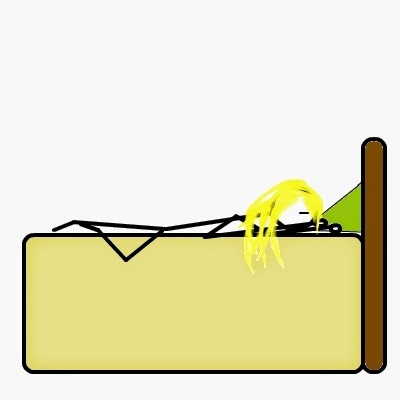
No Labor Day
The first Labor Day event was a New York City parade in 1882. Union leaders wanted a "monster" labor festival on September 5, which was a Tuesday. By the end of the day, around 10,000 people had marched in the parade. The media called it a day "of the people." That's the origin of the very first Labor Day. Since then, it's become a widely-celebrated holiday in the U.S. and around the world.
So how are you celebrating it? Because there are days when you shouldn't write, despite what some others will tell you. Today may be one of those days.
Writing daily is a lovely thought, isn't it? You'll just sit in some architecturally fantastic room that has all the stuff you need in it, mostly peace and quiet, and you'll pour amazing words onto blank pages every single day until you're dishing out multiple novels a year and getting fan mail all the time and everyone loves you. But that's probably not going to happen, and I'm sorry about that.
The reality is that there are lots of times when you're going to be staring at a blank page instead of writing on it. You won't get peace and quiet. Your room will not be perfect, or sometimes even comfortable. And there will be days when you don't even get the chance to write because there are 749 other things to do.
So when you get a day off, or a little bit of free time, you want to fill it up with writing tasks. You need to hammer out that outline. You need to take a closer look at that great idea you jotted down, and figure out what you meant when you wrote "yojgenfar" on that napkin. You need to finish that chapter, change that scene, do that editing.
But you also need to rest. If you work all the time and write every second and push yourself, you'll wind up pushing yourself past the breaking point. It's very easy to be idle when you're a writer, to spend too much time with your feet up on the desk and too many hours staring at the TV. But I'm one of those writers who tends to go in the other direction. I work so much, I had to put special apps on my phone so I could work while I'm doing other things around the house. I didn't get the apps for when I'm out and about, I got them so I don't have to go more than 5 minutes without getting something done.
A lot of indie writers are that way; they haven't got a choice. When you're trying to squeeze two or three lives into one, it's going to take a helluva lotta apps to keep everything sorted out and maintain the highest possible levels of productivity. So when you have a chance to take a day of rest, take it to rest. You don't have to write all the time, and in fact you shouldn't. You'll exhaust yourself and your creativity, and you won't be putting forth your best writing.

No Labor Day
The first Labor Day event was a New York City parade in 1882. Union leaders wanted a "monster" labor festival on September 5, which was a Tuesday. By the end of the day, around 10,000 people had marched in the parade. The media called it a day "of the people." That's the origin of the very first Labor Day. Since then, it's become a widely-celebrated holiday in the U.S. and around the world.
So how are you celebrating it? Because there are days when you shouldn't write, despite what some others will tell you. Today may be one of those days.
Writing daily is a lovely thought, isn't it? You'll just sit in some architecturally fantastic room that has all the stuff you need in it, mostly peace and quiet, and you'll pour amazing words onto blank pages every single day until you're dishing out multiple novels a year and getting fan mail all the time and everyone loves you. But that's probably not going to happen, and I'm sorry about that.
The reality is that there are lots of times when you're going to be staring at a blank page instead of writing on it. You won't get peace and quiet. Your room will not be perfect, or sometimes even comfortable. And there will be days when you don't even get the chance to write because there are 749 other things to do.
So when you get a day off, or a little bit of free time, you want to fill it up with writing tasks. You need to hammer out that outline. You need to take a closer look at that great idea you jotted down, and figure out what you meant when you wrote "yojgenfar" on that napkin. You need to finish that chapter, change that scene, do that editing.
But you also need to rest. If you work all the time and write every second and push yourself, you'll wind up pushing yourself past the breaking point. It's very easy to be idle when you're a writer, to spend too much time with your feet up on the desk and too many hours staring at the TV. But I'm one of those writers who tends to go in the other direction. I work so much, I had to put special apps on my phone so I could work while I'm doing other things around the house. I didn't get the apps for when I'm out and about, I got them so I don't have to go more than 5 minutes without getting something done.
A lot of indie writers are that way; they haven't got a choice. When you're trying to squeeze two or three lives into one, it's going to take a helluva lotta apps to keep everything sorted out and maintain the highest possible levels of productivity. So when you have a chance to take a day of rest, take it to rest. You don't have to write all the time, and in fact you shouldn't. You'll exhaust yourself and your creativity, and you won't be putting forth your best writing.
Published on September 01, 2014 05:30



